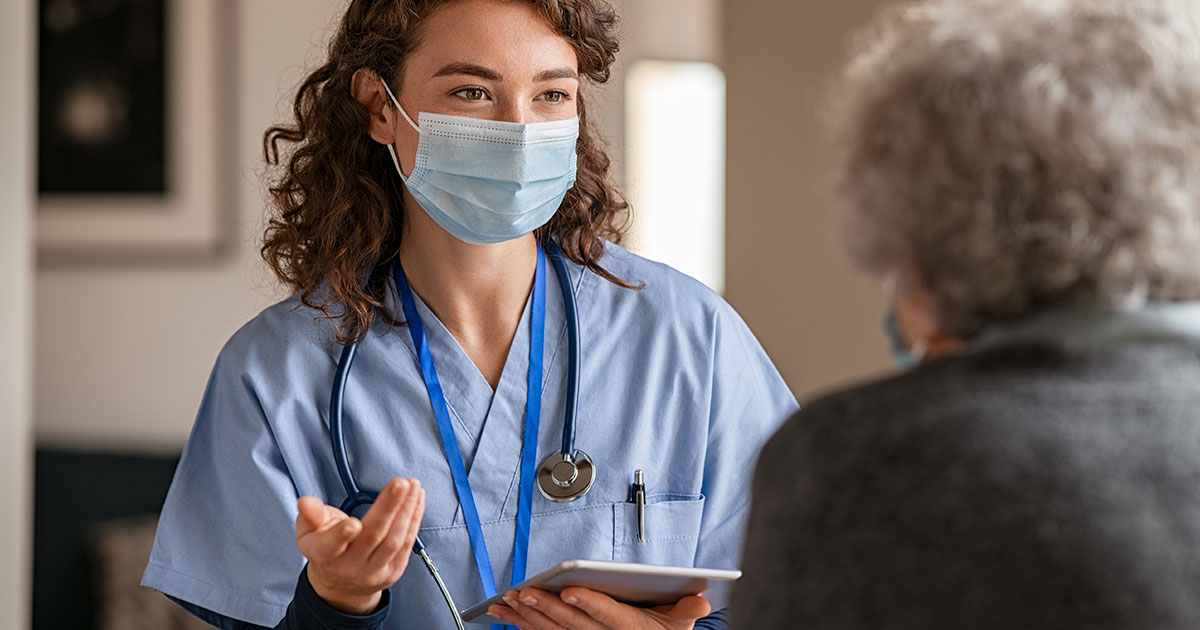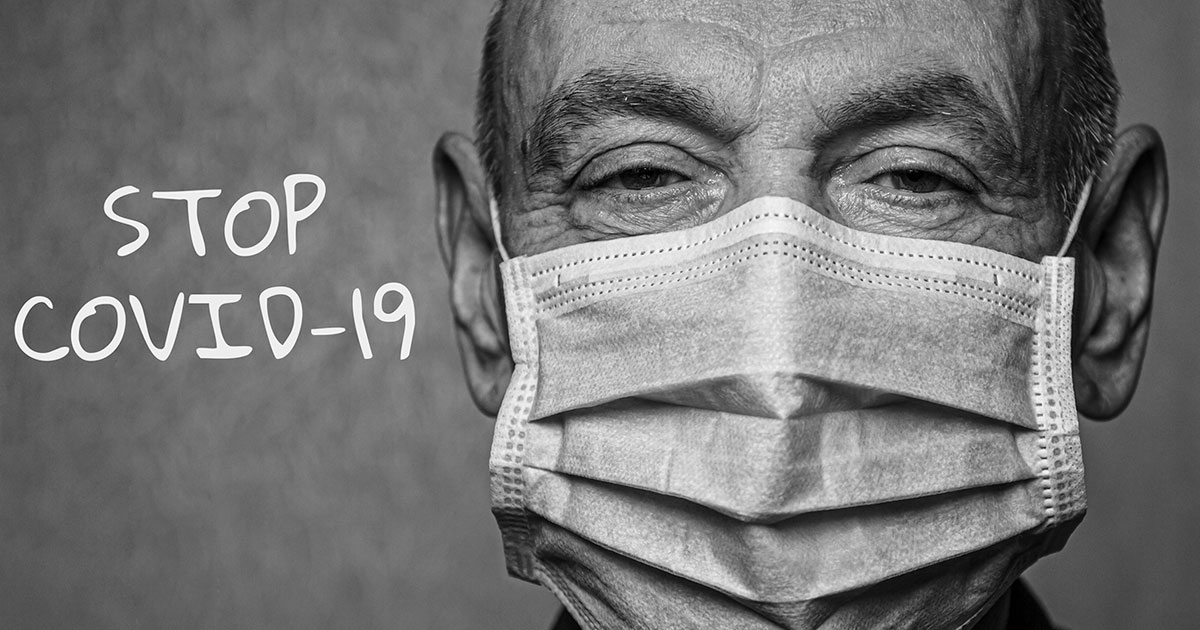
In the midst of the COVID-19 pandemic, it is especially important to take the necessary precautions to keep those within at-risk demographics safe. This version of the coronavirus has proven to be dangerous when the infection takes hold in older adults and the elderly population. This is for a number of reasons, including increased likelihood for more pre-existing conditions, a higher prevalence of chronic disease, and declining function of the immune system with age. Among the conditions that make it more difficult to fight coronavirus are heart disease, diabetes, or chronic respiratory diseases such as asthma and pulmonary hypertension. Since it is highly likely that geriatrics will already be taking medicine for other conditions, it may make treatment efforts for COVID-19 more susceptible to complications.
Given the unique needs of older adults who contract COVID-19, geriatric medicine and the services they provide have had to shift to meet the challenges of this disease. While each patient and case is different (and this article does not constitute medical advice), protocols have been put into place to help geriatric patients regain their health after testing positive for COVID-19.
COVID-19 Testing and Lab Work
Patients who have had contact with someone who was COVID-19 positive, or who have been experiencing COVID-19 symptoms, should contact their primary care physician as soon as possible to discuss scheduling a test. Common COVID-19 symptoms for all ages include:
- Fever or chills
- Cough
- Shortness of breath or difficulty breathing
- Fatigue
- Muscle or body aches
- Headache
- New loss of taste or smell
- Sore throat
- Congestion or runny nose
- Nausea or vomiting
- Diarrhea
These symptoms can range from mild to severe illness, and may appear 2-14 days after exposure to the coronavirus. If testing determines that a patient is COVID-19 positive, additional lab testing and blood work should be conducted to establish benchmarks of patient health, identify any significant risk factors, and begin to track the body’s immune response. These tests include:
- Complete Blood Count (CBC): a blood test used to evaluate the overall health of a patient and detect a wide range of disorders. This test will measure several things within the blood such as red blood cells, white blood cells, hemoglobin, hematocrit, and platelets. Test results will help to flag any additional underlying medical conditions that could impact the approach to treatment.
- Comprehensive Metabolic Panel (CMP): a blood test that provides insight regarding the body’s chemistry and metabolism. It will hold information on the body’s fluid balance, levels of electrolytes, and kidney and liver function (among other factors).
- Procalcitonin (PCT): a blood test to determine if there is a presence of bacterial sepsis, which can develop into a life-threatening systemic infection.
- Prothrombin Time Test (PT/INR): a blood test that measures how quickly a patient’s blood clots and determines if there are any present bleeding disorders.
- D-Dimer Test: a blood test to verify that there is no presence of a serious blood clot in the body.
Diagnostic Imaging
It is important for older adults to undergo diagnostic imaging tests to further determine what is happening within the body. These images will allow for better treatment and may serve as another resource to determine how COVID is affecting the body internally over time.
The focal point of diagnostic imaging for COVID-19 will be (in most cases) an X-ray of the chest. While the chest X-ray may appear normal in the early stages of COVID-19, readings for patients with severe cases of the disease may resemble pneumonia or acute respiratory distress syndrome (ARDS). In addition to the chest X-ray, the physician should also monitor the patient’s breathing to determine that no abnormal lung sounds are present.
Geriatric Medicine and Supplemental Treatments for COVID-19
Since this coronavirus affects people in different ways, there is not a standardized method of treatment for all. In fact, some patients may be asymptomatic (but still contagious) and not require focused health-care interventions. However, we now have a better sense of what to expect for geriatric care in relation to COVID-19 and commonly prescribed medications. Please note that if symptoms are severe the patient should seek immediate medical help.
If the geriatric patient is symptomatic but is not needing to visit the hospital for ongoing care and nursing, they should be prescribed medicine that can be taken from home instead. This will depend on the symptoms they are experiencing as well as their severity. For instance, if a cough is a prevalent symptom a patient may be instructed to take Dexamethasone for a ten-day treatment.
When it comes to geriatric medicine to combat COVID-19, there are a variety of potential treatments to help relieve discomfort, fight the infection from worsening, and help the patient recover:
- If symptoms begin to get worse, they may be prescribed stronger medications such as Azithromycin (an antibiotic used to treat an array of bacterial infections) or Augmentin (another antibiotic used to treat bacterial infections including lower respiratory tract infections).
- Pulmicort, which is administered through an inhaler, is used to control and prevent wheezing and shortness-of-breath-symptoms, which may be present with a COVID-19 infection.
- Cepacol Sore Throat (benzocaine/menthol lozenges) can be taken regularly for persistent coughs and sore throat pain.
- Zinc has demonstrated effectiveness in impairing replication in some RNA viruses. While the relationship between COVID-19 and zinc is still being investigated, it is well-known for its anti-viral properties and could play a role in preventing severe illness from this coronavirus.
- Melatonin, although mostly known as a helpful sleep aid, could be a helpful health care supplement for those infected with COVID-19. Melatonin enhances the immune system by protecting the cells that line the respiratory tract from infection and damage. This means that melatonin may play a role in reducing the inflammation and damage to lung tissue as is found in some severe coronavirus cases.
- Vitamin D is another supplement that supports the immune system, and it has been confirmed that a Vitamin D deficiency can make people more susceptible to viral infections. While the correlation of Vitamin D helping protect against severe COVID-19 symptoms is uncertain, it is being investigated, and at the very least it can help bolster overall immune health.
- For older adults who receive elevated results from their D-Dimer Test, Lovenox (an anticoagulant) injections can be administered to help prevent the formation of blood clots and pulmonary embolisms.
- Starting the day off with a Famotidine capsule can treat a patient’s everyday heartburn, but may also improve the outcomes of COVID-19 infections.
- When it comes to administering various medical treatments for an older adult, the setting and environment must be considered. If the patient is in congregant senior living or is unable to isolate themselves at home, they should stop the use of nebulizers for medicine delivery and instead switch to handheld devices when appropriate.
- For geriatrics who have a pre-existing condition of diabetes, the monitoring of finger stick checks should be increased to four times a day: before meals and at bedtime. For patients experiencing high levels of blood glucose, Lispro (a type of insulin) can be utilized to keep it in check.

Basic Care Considerations for COVID-19 Patients
There are some basic efforts that can be made by patients battling and recovering from COVID-19. Patients should do their best to rest and get sleep to support immune function. For patients that are bed bound as a result of COVID-19, it is important that they rotate side to side every hour they are awake to promote respiratory effort.
Hydration should also be a top priority to help boost the immune system. Hydration helps to oxygenate the cells and keep them working at their full capacity (and fighting against any foreign bodies in the system). We recommend six ounces of Gatorade (or similar) or water every two hours while awake for optimal hydration levels.
Depending on how COVID-19 has affected the patient, long term care in the form of nursing or physical therapy may be necessary or recommended for older adults. This will help them regain their strength and health, and transition them back to their normal routine.
Decision Making: Two Ends of the Spectrum
For older adults who test positive for coronavirus but are fortunate enough to be asymptomatic or only experiencing mild symptoms, over-the-counter medicines and supplements should be sufficient before needing more clinical treatments. Still, it is imperative that they monitor their health closely and alert their primary care physician if there are any significant changes in symptoms. Regardless of their condition, patients should plan to discuss their progress with their physician on a weekly basis (at minimum) to ensure that the recovery is progressing well.
Alternatively, if a patient under care has their oxygen drop below 90% as a result of the coronavirus, the infection is severe. At this point it is likely that they will need acute care or a palliative focus with hospice, depending on the family’s goals. It is our sincere hope that this will not be a conversation that needs to be had, but families of geriatrics must be aware of the seriousness of COVID-19 amongst this vulnerable population.
Conclusion
Regardless of one’s age, the best way to prevent a COVID-19 infection is to stay healthy and stay safe through social distancing, wearing a mask to lessen the chance of both spread and infection, and continuing to diligently wash hands. For those who do get infected, it is important for them to take it seriously (even without symptoms) and work with their primary care physician to get the treatment and resources they will need for a full recovery.
